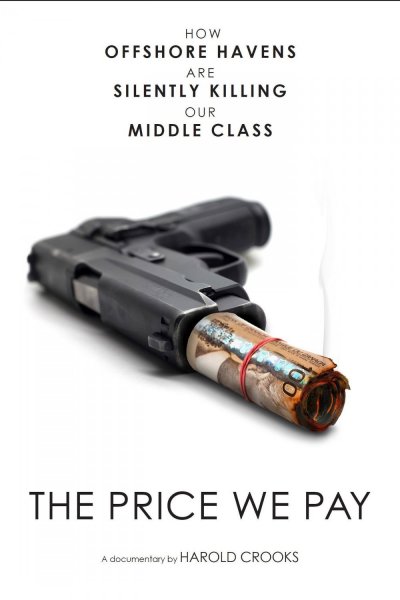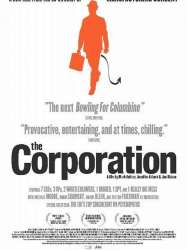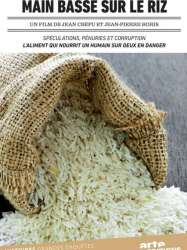The Price We Pay is a canadien film of genre Documentary
The Price We Pay (2014)

If you like this film, let us know!
- Infos
- Casting
- Technical infos
- Photos
- Videos
- Film quotes
- Characters
- Music
- Awards
OriginCanada
Genres Documentary
Themes La mondialisation, Films about the labor movement, Documentary films about business, Documentaire sur le monde du travail
Rating73%










Le Prix à payer (titre original : The Price We Pay) est un film documentaire canadien réalisé par Harold Crooks, sorti en 2014. Il est inspiré du livre La Crise fiscale qui vient, de la fiscaliste canadienne Brigitte Alepin.
Synopsis
Le documentaire porte sur les mécanismes d'évasion fiscale grâce auxquels les multinationales parviennent à ne pas payer des milliards de dollars en impôt. Cette évasion fiscale conduit à un accroissement des inégalités de revenu, et appauvrit les classes moyennes. Le film s'efforce en particulier de montrer le rôle de la place financière de Londres dans cette évasion fiscale en s'appuyant notamment sur l'expertise du Tax Justice Network.Comments
Leave comment :
Suggestions of similar film to The Price We Pay
There are 8957 with the same cinematographic genres, 1411 films with the same themes (including 12 films with the same 4 themes than The Price We Pay), to have finally 70 suggestions of similar films.If you liked The Price We Pay, you will probably like those similar films :

The Big One (1998)
, 1h31Directed by Michael Moore
Origin USA
Genres Documentary
Themes La mondialisation, Films about the labor movement, La précarité, Documentary films about business, Documentaire sur l'altermondialisme, Documentary films about politics, Documentaire sur le monde du travail, Political films
Actors Michael Moore, Garrison Keillor
Rating70%





The Big One est un documentaire américain de Michael Moore réalisé en 1997 lors de la tournée de promotion de son livre Downsize This! à travers les États-Unis. À chaque ville traversée le film montre la réalité sociale et le chômage en allant à la rencontre des salariés et des dirigeants d'entreprise. Il dénonce les pratiques de multinationales qui licencient leur personnel alors qu'elles font des bénéfices, ou comme Nike, dont certains sous-traitants utilisent le travail des enfants.

Inside Job (2010)
, 1h48Directed by Charles H. Ferguson
Origin USA
Genres Documentary, Crime
Themes La mondialisation, Films about the labor movement, Documentary films about business, Documentary films about historical events, Documentary films about politics, Documentaire sur le monde du travail, Political films
Actors Matt Damon
Rating81%





The documentary is split into five parts. It begins by examining how Iceland was highly deregulated in 2000 and the privatization of its banks. When Lehman Brothers went bankrupt and AIG collapsed, Iceland and the rest of the world went into a global recession.

The Corporation (2003)
, 2h25Directed by Jennifer Abbott, Mark Achbar
Origin Canada
Genres Documentary
Themes Environmental films, Medical-themed films, La mondialisation, Films about the labor movement, Documentary films about business, Documentary films about environmental issues, Documentaire sur une personnalité, Documentary films about politics, Documentary films about health care, Documentaire sur le monde du travail, Films about psychiatry, Films about disabilities, Political films
Actors Michael Moore, Naomi Klein
Rating79%





The documentary shows the development of the contemporary business corporation, from a legal entity that originated as a government-chartered institution meant to affect specific public functions to the rise of the modern commercial institution entitled to most of the legal rights of a person. The documentary concentrates mostly upon North American corporations, especially those in the United States. One theme is its assessment of corporations as persons, as a result of an 1886 case in the United States Supreme Court in which a statement by Chief Justice Morrison R. Waite led to corporations as "persons" having the same rights as human beings, based on the Fourteenth Amendment to the United States Constitution.

Cursed for Gold (2008)
, 1h33Directed by Olivier Weber
Origin France
Genres Documentary
Themes Environmental films, La mondialisation, Films about the labor movement, Documentary films about business, Documentaire sur l'altermondialisme, Documentary films about environmental issues, Documentaire sur le monde du travail, Documentary films about nature, L'Or

Voices of Transition (2012)
, 1h5Origin France
Genres Documentary
Themes Environmental films, La mondialisation, Films about the labor movement, Documentary films about business, Documentary films about environmental issues, Documentary films about technology, Documentaire sur le monde du travail, Disaster films
Rating75%





Using interviews and overlays of graphics and text, the film presents the current problems facing industrial agriculture. It explores why in the interviewees' view the current industrial model is not up to the task of feeding the world's people. According to the film every calorie of energy contained in a food source currently takes between 10 and 20 calories of crude oil in the production of fertilizers and transportation to produce, leading to a strong dependence of the cost of food on oil prices. As a result of peak oil and increasing oil prices this dependence will lead to ever increasing food prices. According to the film, this dependence already represents a significant weak-spot in the global food supply chain. Additionally, agriculture is already responsible for 40% of greenhouse gas emissions, contributing to climate change. Furthermore, the film argues that the overuse of inorganic fertilizers has been responsible for the loss of soil fertility and threatens the complete loss of usable soil within the next decades through soil erosion and sinking crop yields. These effects, according to the film, can only be partly mitigated by the increased use of those same fertilizers. The loss of workplaces, the concentration of land in the hands of a few (allegedly a farm closes every 23 minutes in France) as well as the dependence on large corporations are enumerated as side effects of the industrialisation of agriculture since the 1920s. Companies, such as Monsanto and Bayer, control everything from seed stock to fertilizers and the necessary chemical mixes for hybrid plants, thereby controlling the entire supply chain. The film argues that this development was supported through subsidies from the World Bank. Interviews with Vandana Shiva, the founder of the Transition Towns movement Rob Hopkins and various agricultural experts serve to argue this viewpoint. The dependence on crude oil is illustrated through the example of the wholesale food market in Rungis.

The Light Bulb Conspiracy (2010)
, 1h15Genres Documentary
Themes Environmental films, La mondialisation, Films about the labor movement, Documentary films about business, Documentaire sur l'altermondialisme, Documentary films about environmental issues, Documentary films about historical events, Documentary films about technology, Documentaire sur le monde du travail
Actors Casey Neistat
Rating79%





Un historique de cette stratégie commerciale et industrielle visant à limiter la durée de vie de certains produits ou appareils est relaté à travers plusieurs exemples particulièrement significatifs.

Our Daily Bread (2006)
, 1h32Directed by Nikolaus Geyrhalter
Origin Austria
Genres Documentary
Themes Cooking films, Environmental films, La mondialisation, Films about the labor movement, Documentaire sur la cuisine, Documentary films about business, Documentary films about environmental issues, Documentaire sur le monde paysan, Documentaire sur le monde du travail
Rating75%





Le documentaire fournit des images sur le fonctionnement des plus grandes industries agroalimentaires européennes que ce soit dans le domaine de la production des fruits et légumes que dans celle de la viande. Ni musique ni commentaire ne viennent accompagner les séquences filmées. Le décor est constitué de champs, d'usines, d'abattoirs, et le réalisateur utilise de longs plans fixes y compris pour filmer les ouvriers en train de manger.

We Feed the World (2005)
, 1h36Directed by Erwin Wagenhofer
Origin Austria
Genres Documentary
Themes Cooking films, Environmental films, La mondialisation, Films about the labor movement, Documentaire sur la cuisine, Documentary films about business, Documentaire sur l'altermondialisme, Documentary films about environmental issues, Documentaire sur la malbouffe, Documentaire sur le monde paysan, Documentary films about health care, Documentaire sur le monde du travail
Rating74%





Avec We Feed the World, le documentariste Erwin Wagenhofer propose aux spectateurs un regard sur l'agriculture mondiale moderne. En passant par la Roumanie, l'Autriche, le Brésil, la France et l'Espagne, son enquête se focalise sur la manière dont est fabriqué ce qui arrive dans notre assiette. Il montre que la domination du Nord sur le Sud est prégnante. Comment est-il possible qu'en Afrique l'on achète des produits européens ou asiatiques comme le poulet thaïlandais ? Le réalisateur présente une face peu connue de la mondialisation : en achetant un poulet industriel, on contribue au défrichement de l'Amazonie car le Brésil déforeste pour cultiver le soja qui sert à nourrir les volailles élevées en batterie (90 % de la production de soja du Brésil est exportée). Le documentaire souligne également la différence entre industrie agroalimentaire et petite exploitation. We Feed the World adopte un style « coup de poing » visant à éveiller les consciences.

Main basse sur le riz (2010)
, 1h24Genres Documentary
Themes Cooking films, La mondialisation, Films about the labor movement, Documentaire sur la cuisine, Documentary films about business, Documentaire sur le monde du travail
Rating58%





Ce documentaire d’investigation s'intéresse au marché du riz, l'un des produits de base de l'alimentation des plus pauvres.
 , 1h48
, 1h48Directed by Marie-Monique Robin
Origin France
Genres Documentary
Themes Environmental films, La mondialisation, Films about the labor movement, Documentary films about business, Documentaire sur l'altermondialisme, Documentary films about environmental issues, Documentaire sur le monde du travail
Rating79%





The film reports many controversies surrounding the use and promotion of genetically modified seeds, polychlorinated biphenyls (PCBs), Agent Orange, and bovine growth hormone. Cases in the United States (including Anniston, Alabama), Canada, India, Mexico, Paraguay, the United Kingdom (Scotland) and France, are explored, claiming that the Monsanto corporation's collusion with governments, pressure tactics, suppression and manipulation of scientific data, and extra-legal practices aided the company's attempts at dominating global agriculture. Scientists, representatives of the United States Food and Drug Administration and the United States Environmental Protection Agency, civil society representatives, victims of the company’s activities, lawyers, and politicians are interviewed.
 Connection
Connection